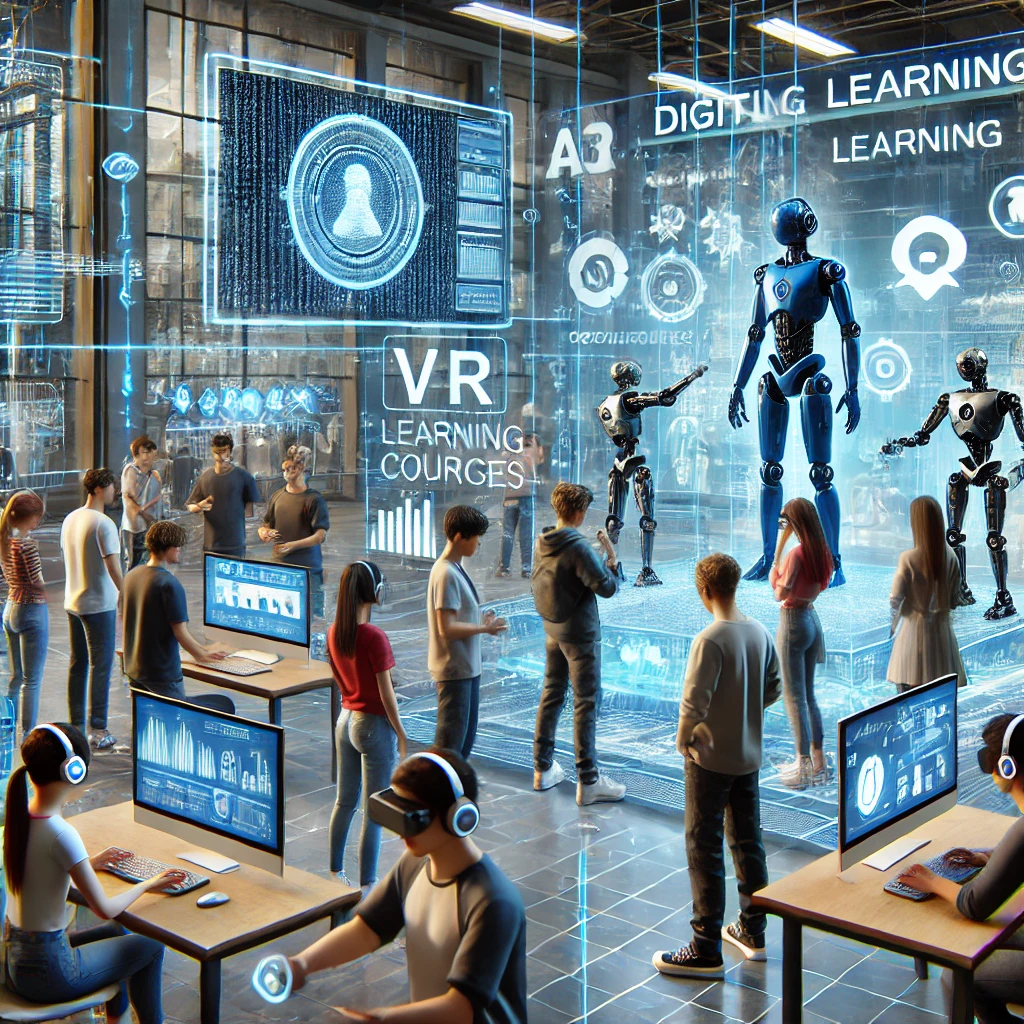Integration of Digital Technologies in Skill Development
Introduction
The rapid advancements in digital technologies have revolutionized various sectors, and skill development is no exception. In an era where technology-driven innovations define industrial progress, integrating digital technologies into skill development has become a necessity. With the rise of automation, artificial intelligence (AI), the Internet of Things (IoT), and other Industry 4.0 technologies, traditional skill development methods must evolve to meet the demands of the digital economy.
The Need for Digital Technologies in Skill Development
The global workforce is undergoing a transformation driven by technological advancements. Organizations are increasingly prioritizing employees who possess digital skills, making it imperative for training institutions and governments to adopt digital technologies in skill development. Some key reasons include:
Bridging the Skill Gap: The gap between industry requirements and workforce capabilities has widened. Digital learning platforms help bridge this gap by providing flexible and up-to-date training.
Increased Accessibility: Traditional training centers have geographical and logistical limitations. Digital platforms allow learners to access courses anytime and from anywhere, promoting inclusivity.
Personalized Learning: AI-driven learning management systems (LMS) analyze individual learning patterns and tailor courses accordingly, improving efficiency and engagement.
Industry 4.0 Readiness: The future of work revolves around robotics, AI, and big data. Digital skills training ensures that employees are ready for upcoming technological disruptions.
Key Digital Technologies Transforming Skill Development
1. Artificial Intelligence (AI) and Machine Learning (ML)
AI-powered learning platforms provide personalized recommendations, adaptive learning, and real-time assessments. Machine learning algorithms analyze user progress and suggest improvements, making skill development more effective. Chatbots and virtual assistants enhance learning experiences by offering instant support and guidance.
2. Learning Management Systems (LMS)
LMS platforms facilitate the administration, documentation, tracking, and delivery of educational courses. Modern LMS integrates AI and analytics to monitor progress and improve learning outcomes. Examples include Moodle, Blackboard, and Google Classroom.
3. Augmented Reality (AR) and Virtual Reality (VR)
Immersive technologies such as AR and VR provide hands-on experience without physical limitations. Industries like healthcare, manufacturing, and aviation use these technologies for training in real-world scenarios. For instance, VR-based simulations allow medical students to practice surgeries in a risk-free environment.
4. Blockchain in Education
Blockchain ensures data security and transparency in skill certification. Digital credentials stored on a blockchain network prevent fraud and make verification easier for employers. This technology also enables a decentralized and tamper-proof record of educational achievements.
5. Internet of Things (IoT)
IoT-enabled training tools enhance skill development in technical fields like engineering and automation. Smart labs and connected devices facilitate remote learning by providing real-time data and interactive experiences.
6. Cloud Computing
Cloud-based learning platforms allow institutions to store and access educational resources from any location. This technology reduces infrastructure costs while enabling seamless collaboration between learners and instructors.
7. Big Data and Analytics
Data-driven insights help educators understand learning patterns, measure effectiveness, and optimize training modules. Analytics-driven platforms enable institutions to track skill development trends and improve content delivery.
Advantages of Digital Technologies in Skill Development
1. Scalability
Digital platforms enable large-scale skill development programs, reaching a global audience with minimal investment in physical infrastructure.
2. Cost-Effectiveness
Online learning reduces costs associated with traditional training, such as travel, accommodation, and printed materials. Employers also benefit by reducing training expenses while enhancing workforce skills.
3. Real-Time Skill Assessment
Automated assessments and data analytics provide real-time feedback, enabling learners to identify areas for improvement and trainers to refine their methodologies.
4. Lifelong Learning
Continuous skill enhancement is crucial in a fast-changing job market. Digital learning platforms facilitate lifelong learning by providing access to diverse courses and skill-building programs.
Challenges in Integrating Digital Technologies
1. Digital Divide
Access to high-speed internet and digital devices remains a challenge in remote and rural areas. Bridging this divide is crucial for equitable skill development.
2. Resistance to Change
Many traditional educators and institutions are reluctant to adopt digital methodologies due to lack of awareness or technical expertise.
3. Cybersecurity Risks
Online learning platforms face risks related to data breaches and unauthorized access. Ensuring robust cybersecurity measures is essential to protect learners' information.
4. Quality Control
Not all digital courses maintain high educational standards. Regulatory frameworks and accreditation processes must be established to ensure the credibility of online skill development programs.
Case Studies and Global Trends
1. India’s Skill India Digital Initiative
The Government of India launched the Skill India Digital Platform to provide skill training to millions of individuals. The platform integrates AI-driven learning, job placement support, and industry collaboration to improve employability.
2. Google’s Digital Garage
Google offers free digital training programs globally through its Digital Garage initiative. The platform focuses on skills like digital marketing, coding, and data analytics.
3. IBM SkillsBuild
IBM provides AI-powered learning for individuals seeking to upskill in emerging technologies such as AI, cybersecurity, and cloud computing. This initiative focuses on preparing the workforce for future technological disruptions.
Future of Digital Skill Development
As technology continues to evolve, digital skill development will become more immersive, interactive, and data-driven. Some future trends include:
Metaverse for Learning: Virtual environments will simulate real-world workspaces, allowing learners to gain hands-on experience.
AI-Powered Career Counseling: AI-driven platforms will guide learners toward career paths based on their skills and interests.
5G-Enabled Learning: High-speed connectivity will enhance digital education accessibility and performance.
Gamification in Learning: Game-based learning will boost engagement and retention through interactive experiences.
Conclusion
The integration of digital technologies in skill development is reshaping how individuals acquire and enhance their skills. Governments, educational institutions, and private enterprises must collaborate to leverage these technologies effectively. While challenges exist, proactive measures such as improving digital infrastructure, promoting awareness, and ensuring quality control can drive a more inclusive and tech-driven skill development ecosystem. By embracing digital transformation, the workforce of the future will be better equipped to thrive in a rapidly evolving global economy.




